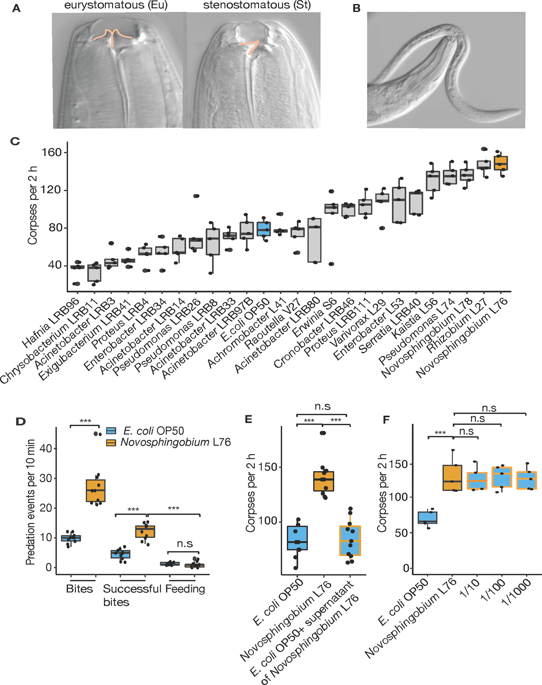Our official English website, www.x-mol.net, welcomes your
feedback! (Note: you will need to create a separate account there.)
Bacterial vitamin B12 production enhances nematode predatory behavior.
The ISME Journal ( IF 10.8 ) Pub Date : 2020-03-09 , DOI: 10.1038/s41396-020-0626-2 Nermin Akduman 1 , James W Lightfoot 1 , Waltraud Röseler 1 , Hanh Witte 1 , Wen-Sui Lo 1 , Christian Rödelsperger 1 , Ralf J Sommer 1
The ISME Journal ( IF 10.8 ) Pub Date : 2020-03-09 , DOI: 10.1038/s41396-020-0626-2 Nermin Akduman 1 , James W Lightfoot 1 , Waltraud Röseler 1 , Hanh Witte 1 , Wen-Sui Lo 1 , Christian Rödelsperger 1 , Ralf J Sommer 1
Affiliation

|
Although the microbiota is known to affect host development, metabolism, and immunity, its impact on host behavior is only beginning to be understood. In order to better characterize behavior modulation by host-associated microorganisms, we investigated how bacteria modulate complex behaviors in the nematode model organism Pristionchus pacificus. This nematode is a predator that feeds on the larvae of other nematodes, including Caenorhabditis elegans. By growing P. pacificus on different bacteria and testing their ability to kill C. elegans, we reveal large differences in killing efficiencies, with a Novosphingobium species showing the strongest enhancement. This enhanced killing was not accompanied by an increase in feeding, which is a phenomenon known as surplus killing, whereby predators kill more prey than necessary for sustenance. Our RNA-seq data demonstrate widespread metabolic rewiring upon exposure to Novosphingobium, which facilitated screening of bacterial mutants with altered transcriptional responses. We identified bacterial production of vitamin B12 as an important cause of such enhanced predatory behavior. Although vitamin B12 is an essential cofactor for detoxification and metabolite biosynthesis, shown previously to accelerate development in C. elegans, supplementation with this enzyme cofactor amplified surplus killing in P. pacificus, whereas mutants in vitamin B12-dependent pathways reduced surplus killing. By demonstrating that production of vitamin B12 by host-associated microbiota can affect complex host behaviors, we reveal new connections between animal diet, microbiota, and nervous system.
中文翻译:

细菌维生素 B12 的产生增强了线虫的捕食行为。
虽然已知微生物群会影响宿主发育、新陈代谢和免疫,但它对宿主行为的影响才刚刚开始被理解。为了更好地表征宿主相关微生物的行为调节,我们研究了细菌如何调节线虫模式生物太平洋太平洋太平洋鱼的复杂行为。这种线虫是一种捕食者,以其他线虫的幼虫为食,包括秀丽隐杆线虫。通过在不同细菌上培养 P. pacificus 并测试它们杀死秀丽隐杆线虫的能力,我们揭示了杀死效率的巨大差异,其中 Novosphingobium 物种显示出最强的增强。这种增强的杀戮并没有伴随着摄食的增加,这是一种被称为过度杀戮的现象,捕食者杀死的猎物超过了维持所需的数量。我们的 RNA-seq 数据表明,在暴露于 Novosphingobium 后会发生广泛的代谢重新布线,这有助于筛选具有改变的转录反应的细菌突变体。我们确定维生素 B12 的细菌产生是这种增强的捕食行为的重要原因。尽管维生素 B12 是解毒和代谢物生物合成的重要辅助因子,先前已显示可加速秀丽隐杆线虫的发育,但补充这种酶辅助因子可增强太平洋太平洋假单胞菌的过量杀伤,而维生素 B12 依赖性途径中的突变体则减少了过量杀伤。通过证明宿主相关微生物群产生维生素 B12 可以影响复杂的宿主行为,我们揭示了动物饮食、微生物群和神经系统之间的新联系。
更新日期:2020-03-09
中文翻译:

细菌维生素 B12 的产生增强了线虫的捕食行为。
虽然已知微生物群会影响宿主发育、新陈代谢和免疫,但它对宿主行为的影响才刚刚开始被理解。为了更好地表征宿主相关微生物的行为调节,我们研究了细菌如何调节线虫模式生物太平洋太平洋太平洋鱼的复杂行为。这种线虫是一种捕食者,以其他线虫的幼虫为食,包括秀丽隐杆线虫。通过在不同细菌上培养 P. pacificus 并测试它们杀死秀丽隐杆线虫的能力,我们揭示了杀死效率的巨大差异,其中 Novosphingobium 物种显示出最强的增强。这种增强的杀戮并没有伴随着摄食的增加,这是一种被称为过度杀戮的现象,捕食者杀死的猎物超过了维持所需的数量。我们的 RNA-seq 数据表明,在暴露于 Novosphingobium 后会发生广泛的代谢重新布线,这有助于筛选具有改变的转录反应的细菌突变体。我们确定维生素 B12 的细菌产生是这种增强的捕食行为的重要原因。尽管维生素 B12 是解毒和代谢物生物合成的重要辅助因子,先前已显示可加速秀丽隐杆线虫的发育,但补充这种酶辅助因子可增强太平洋太平洋假单胞菌的过量杀伤,而维生素 B12 依赖性途径中的突变体则减少了过量杀伤。通过证明宿主相关微生物群产生维生素 B12 可以影响复杂的宿主行为,我们揭示了动物饮食、微生物群和神经系统之间的新联系。











































 京公网安备 11010802027423号
京公网安备 11010802027423号